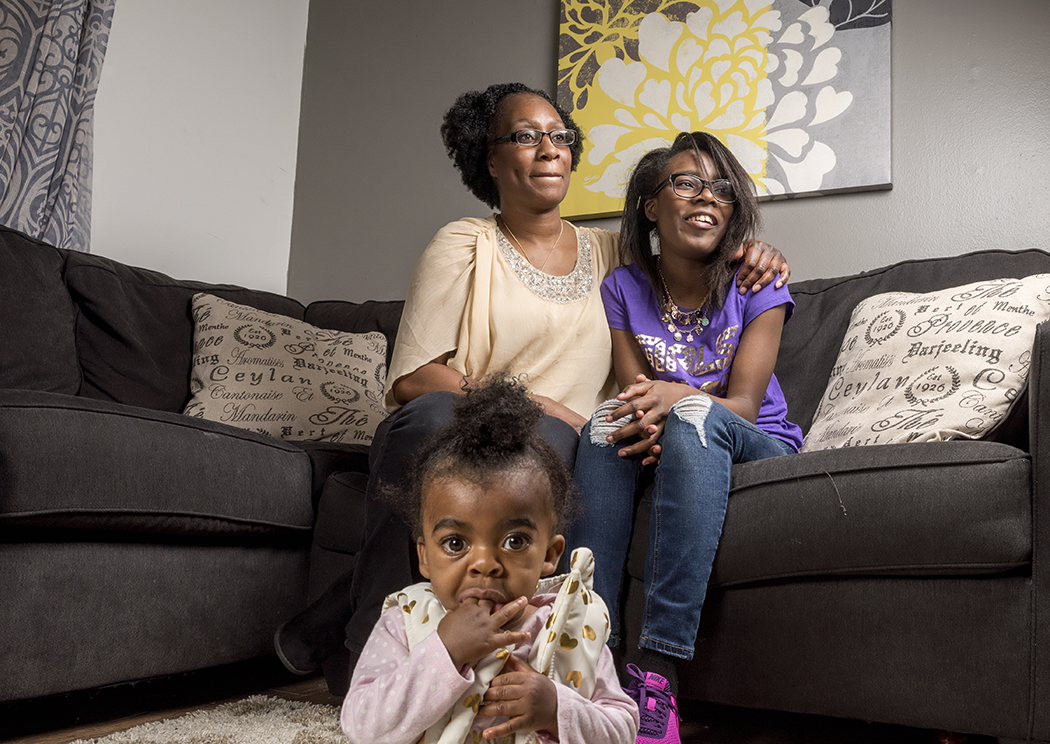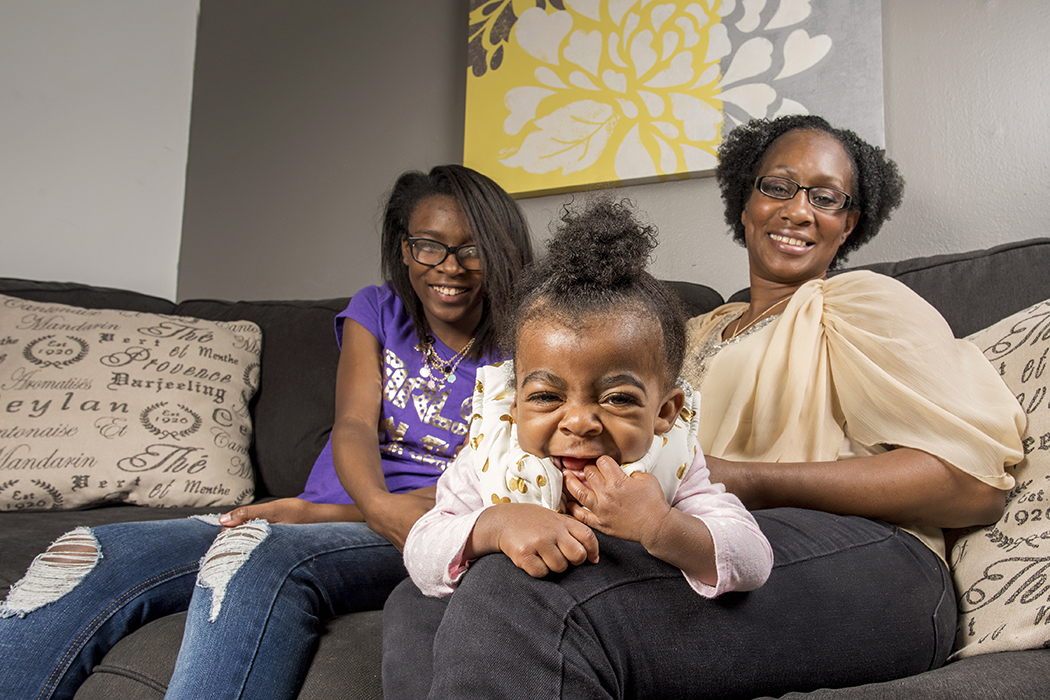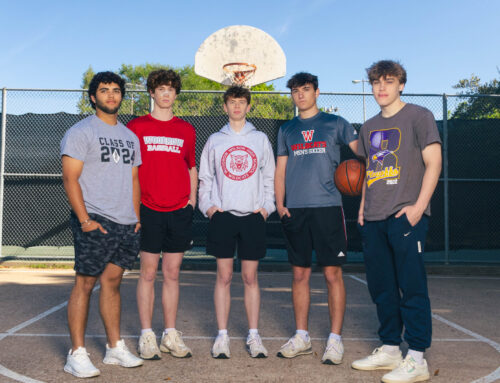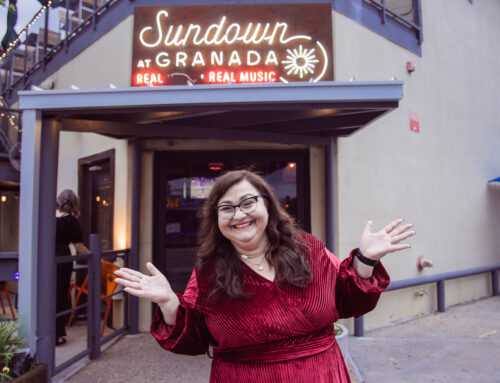
Cred: Danny Fulgencio
Divine Intervention
Janeta Carter isn’t sure if her son will look for her, but she set up a Facebook profile just in case.
The 5-year-old is the only one of Carter’s six children who was adopted by strangers after she relinquished her parental rights.
Carter, 39, repeatedly plays out the possibilities in her mind. Maybe he’ll grow up wondering where his siblings are, or maybe he’ll be so angry that he screams at her.
“I don’t know what the questions or my answers would be, other than I do just want to know that he’s OK,” she says.
In February, Carter graduated from a yearlong program at Exodus Ministries, a faith-based nonprofit that assists formerly incarcerated women. She regained custody of her 13-year-old, Rachel, and is raising her 1-year-old, Dahlia.
There’s a disconnect when Carter talks about her life before she applied for Exodus, as if she’s talking about someone else.
“I’m just grateful to have myself in a good spot, clean off drugs, working toward something in life,” she says.
Carter was the quintessential rebellious preacher’s kid. She drank and did drugs as a teen, but a car wreck was the catalyst for her opioid addiction. She lost her ear in the collision and later became hooked on the Vicodin she was prescribed.
The most crushing consequence of Carter’s addiction wasn’t several trips to jail or a stint in prison. She wasn’t devastated until the court told her to relinquish her parental rights.
“That’s the only time in my life I considered being gone just might be better,” she says. “At least my kids can say, ‘My mom is dead’ versus ‘My mom chose drugs over us.’ ”
Pregnant, she spontaneously looked up hospitals that help expecting addicts. She admitted herself to Parkland, then Nexus Recovery Center, which recommended Carter for Exodus’ program.
A few months later, she, Rachel and Dahlia moved into a two-bedroom apartment on Exodus’ property in East Dallas.
“For Janeta, the difference is night and day,” says Exodus’ executive director Susan Stephens. “I don’t think she thought she was going to make it. … It was almost as if being hopeful took too much energy.”
At Exodus, nonviolent offenders reunite with their children and learn to be independent. The nonprofit provides furnished apartments, Christian counseling and evening classes that range from self-defense and budgeting to Bible study. It also partners with local businesses, such as Subway and Smoothie King, to help women find full-time jobs.
The program requires women to work, among a lengthy list of stipulations. They can’t use their phones for six months. They aren’t allowed to have a car, so they must use public transportation. They undergo apartment checks once a month.
“At first, I was like, ‘Oh my God, they are overdoing it. They’re a little too strict, like prison,’” Carter says. “Now everything makes sense, and it’s for a reason.”

Photo by Danny Fulgencio.
By the end of the year, graduates have a job, at least $2,000 in their savings account and, most importantly, the sense that they’re valued, Stephens says.
“We believe in them even while they don’t believe in themselves. I think, for the most part, that really carries them through.”
Stephens is considered a mother figure — one who must navigate between encouragement and discipline. She knows the program is exhausting, and women choose to leave more often than she likes.
“It’s really heavy to realize that we can’t want it for them,” she says.
In 2017, seven out of 19 women accepted into the program graduated.
Arika Nicholas lived at Exodus for six months when she was asked to pack her belongings.
“I drank in the program, used drugs,” she says. “I made a bunch of poor decisions and put a lot of people in jeopardy.”
She moved in with her parents but continued to spiral before she admitted herself into rehabilitation.
Nicholas asked to return twice, and eventually Exodus agreed — something that happens rarely.
“There are 13,000 incarcerated women in Texas,” Stephens says. “We expect you to be fully engaged. It’s important we offer that spot to someone else, but we do serve a God of redemption.”
Nicholas, who started drugs at 19, is halfway through the program once again.
She’s sober, working full-time and takes care of her 3-year-old, Lizzy.
“I don’t even know, honestly, who I am, what I like, how I feel, but I’m figuring this out as time goes,” she says.
Two weeks before Deanna Brasier moved out of her apartment at Exodus, the mother of three was all nerves.
Brasier, who was homeless and slept in motels for three years, transformed into the person others come to for advice. Sorting out what to tell her 11-year-old son when he called her was a different story. She hadn’t spoken to him since he was 5.
“I didn’t even know if he knew I was his mom,” she says.
When the phone rang, it was hesitant small talk. She told him she tried to see him and left a present at his house. “Did you like it?” she asked.
Brasier showed up at her son’s grandmother’s door on Christmas with a present. He wasn’t home, but at least his grandmother didn’t call the cops like Brasier expected. Instead she told Brasier she was proud of her.
Two months later, Brasier drove to Arkansas to see her eldest sons — the first time all three brothers were together.
“I was very nervous and anxious,” she says. “I didn’t know what to say. It all just came naturally. It was a great feeling to feel like a mom with three boys.”
She’s grateful, she says, that now she’ll be with her sons on their birthdays, Christmas, and, if she’s lucky enough, Thanksgiving.





